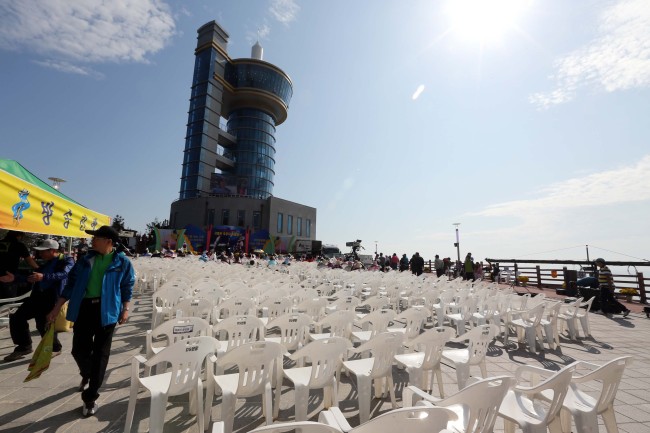 |
Spectators leave an outdoor venue where a series of celebration performances were scheduled to take place near the Naro Space Center in Goheung, South Jeolla Province, Friday. Korea halted its space rocket launch due to fuel leak. (Yonhap News) |
Korea canceled the launch of the Korea Space Launch Vehicle-1, or the Naro rocket, on Friday after detecting a gas leak in the helium injection system.
Officials of the Ministry of Education, Science and Technology and Korea Aerospace Research Institute said that it would have to postpone the launch by at least three days until engineers and researchers fixed the problem.
Korea has until the end of this month to launch the Naro rocket.
Otherwise, the country will need another clearance from global agencies such as the International Maritime Organization and the International Civil Aviation Organization, and set up new launch dates, along with back-up dates.
Such global agencies need to be informed so that precautionary measures could be implemented in the sky and sea by diverting airplanes and vessels away from the rocket.
Officials discovered on Friday morning during preparations that gas was leaking while they were injecting helium into the first-stage rocket provided by Russia. They saw that the seal covering part of the helium supply line was damaged.
Helium is used to pressurize liquid fuel in the first-stage rocket to provide thrust during the liftoff.
Officials said that the Naro rocket had been taken off from the launch platform, and will need to be disassembled in order to thoroughly examine and fix the problem.
KARI has been preparing for the launch over the last three days, checking and rehearsing its steps at the Naro Space Center in Goheung, South Jeolla Province. It reported to the media via press release that all was good to go on Friday, raising public expectations over the rocket launch into space.
Korea has failed twice in 2009 and 2010 to fire its rockets jointly made with Russia.
The first failure was due to a malfunction of a fairing, a cover for the payload satellite. Korea and Russia could not find the reason behind the second rocket which exploded during the initial ascent.
Korea has allocated a budget of over 520 billion won for the development of its Naro space program with Russia since 2002. Russia, the closest competitor to the U.S., was chosen as Korea’s ideal partner given its notable space technology. It succeeded in launching 2,957 rockets out of 3,159 attempts between 1950 and 2011.
Russia agreed to provide up to three liquid rocket engines taking into account the possibility of launch failures. It also shared its know-how in launch pad design and operations with Korea.
Korea, meanwhile, developed the second-stage kick motor and the fairing that would carry its 100kg scientific satellite.
Experts said that Korea has gained enough experience from the past two failures on rocket launch operations.
Meanwhile, China announced that it successfully launched a satellite into space on Thursday.
The satellite will be used for global navigation and positioning systems for transportation, weather and fisheries, according to Chinese media.
By Park Hyong-ki (
hkp@heraldcorp.com)







![[Today’s K-pop] Blackpink’s Jennie, Lisa invited to Coachella as solo acts](http://res.heraldm.com/phpwas/restmb_idxmake.php?idx=644&simg=/content/image/2024/11/21/20241121050099_0.jpg)
